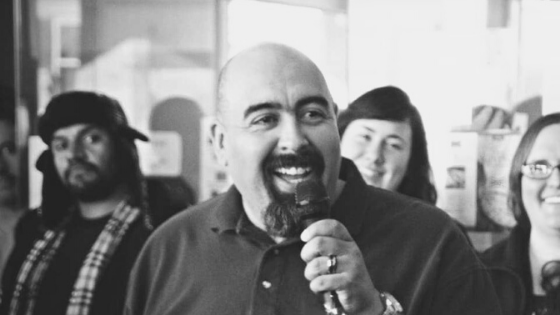Growing in Knowledge and Friendship — Our Work With Jose Osuna
Jose Osuna, principal consultant for Osuna Consulting, has been in Project Legacy’s orbit for years, ever since being approached by our executive director Karen Light Edmonds at a Global Homeboy Network event in Los Angeles.
“What struck me about Jose was his story, and his presence and the respect he had for everyone who was speaking. He gave the same deep attention to everyone no matter who they were, and that’s what we’re all about,” says Light Edmonds. She admits to tracking him down at the following year’s conference.
“They introduced themselves and, you know, Karen, when she wants to meet somebody…” laughs Osuna. “She met me and we've been been friends and doing the work ever since.”
For 8 weeks this spring, the relationship was formalized in a series of online training sessions led by Osuna, held via Zoom. Choosing Osuna was intentional; he and his guest speakers Miguel Lugo, Thaddeus Siles, and Hugo Gonzalez have all been touched by and contributed to the work of Homeboy Industries. That organization, according to Light Edmonds, is one of only a handful around the nation going to similar lengths for its participants as Project Legacy. Osuna is among a handful of people Light Edmonds can turn to for advice, as well.
“Jose’s is the opinion, next to John’s, that I trust the most. What Jose says matters to me and I trust it,” she says.
Much of that trust is derived from Osuna’s professional and personal experiences, which he and his colleagues bring to training sessions. It is that experience that gives his training such power.
“I really believe in a balance between academia, the folks that actually provide the services, and folks that have lived through the same experiences as those they are serving,” says Osuna. ”I think there has to be a strong balance between those different experiences, those different narratives, those different perspectives. And sometimes you're able to really find that combination or or a combination of two out of the three, and an individual becomes even more powerful.”
The sessions he held with Project Legacy staff and volunteers were meant to cover nuances of case management and other fine points. When the training started, we were already worried about the effects COVID-19 would have on our participants. Then, the murder of George Floyd and its aftermath added fuel to a troubled atmosphere.
Learning from and sharing with Osuna and the guest speakers he brought along allowed us to funnel our emotions into a constructive way forward. Thanks to Osuna’s insistence that a trainer’s voice not dominate the session, we taught each other things, too.
A discussion that started about the concept of “meeting people where they are” wound up centering on why students might sleep in the classroom, and why teachers should let them rest.
In another module, we talked about healthy boundaries for participants and case managers. We listened to people who have covered ground we may soon find ourselves on.
Even remotely, those who participated were struck by an almost palpable energy coming off our cell phone and laptop screens. People left those sessions feeling uplifted, even if we had been talking about heavy topics or paperwork.
“The sessions with Project Legacy were surprisingly emotional,” says Osuna. “I think that was a bond that was already there and that just ended up growing even more throughout the sessions. And I think the events that were going on when we started, with George Floyd and all of those things, I think that really fit the energy as well,” says Osuna. “I was very well aware that on many of those days that we had sessions, there were folks on the team that were going to be circle with young folks right after that. I wanted to make sure that they had that space to be able to talk some things through before they engage the kids. So that that energy didn't turn into something negative with the kids.”
Continuing that work is of principal importance. It is, as Osuna puts it, like winning the lottery.
“When I struggled with someone for some time, and I've had to see them hit their head on the wall a few times, when they finally turned the corner and decided they don't want to hit that wall anymore, that's the lotto ticket,” he says.
Maintaining that enthusiasm is something Project Legacy must do; thanks to Osuna’s training, that is now clearer than ever.
Osuna left us with this thought:
“I think it's important that organizations like Project Legacy not just continue to learn from other organizations, but share their knowledge and share their experience because there's learning both ways. At this point, you all have done some some strong work out there that other folks are barely starting to get into,” he says. “You guys are at the forefront on the frontlines of the fight for racial equality in America. You are at the heart of what jumped off these protests, you know, due to the murder of George Floyd. So there was a lot of learning there for me that I'm going to be able to take into my consulting work. I'm going to be able to take it into my organizational work. I'm able to say that I was able to dialogue and learn from the folks that are on the frontlines in Minneapolis, in St. Paul, in Rochester.”
To learn more about Osuna, or to set up consulting work with him, visit https://osunaconsulting.org/about/ and https://restoreink.org/.
Bryan Lund is a writer, ghostwriter, and teacher from Rochester, Minnesota. He started a writer’s workshop for Project Legacy last summer and continues to tutor and volunteer in other capacities.



